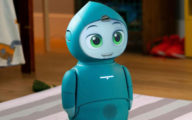Although most home robots have failed, iRobot’s Roomba, the autonomous vacuum cleaner, became the most successful one thus far. People began to relate to the device like it was a person, even giving it names. Former iRobot chief technology officer Paolo Pirjanian explains, “there’s something innate in our mind that triggers when we see something move on its own.” He is now founder/chief executive of Embodied, which is in beta with Moxie, a robot designed to help children improve basic social and cognitive skills.
Wired reports that, according to Pirjanian, “studies have shown that the current generation of children are falling behind on their social, emotional, and communication skills, relative to previous generations … partially attributed to a lot of screen time and social media, but also pressures at school that add to anxiety, depression, and so on.”

Moxie, who has a teardrop-shaped head atop a cylindrical blue body, is “a cross between a video game, a pet, and a teacher.” Its backstory is that a secret laboratory sent it to learn how to be a better friend. The child becomes Moxie’s mentor, with the idea that this will also improve his or her “own cognitive, emotional, and social skills by teaching the robot.”
Companion robots have been shown to be “especially effective for children with neurological disorders like autism,” who often “struggle with eye contact and reading facial expressions.” Pirjanian said that Moxie was originally developed for children on the autism spectrum but, during testing, parents wanted to use it for their neurotypical children. Embedded in Moxie’s head are microphones and cameras that “feed data to machine-learning algorithms so that the robot can carry on a natural conversation, recognize users, and look them in the eye.”
All the data, except Google’s automated speech-recognition, is “crunched by Moxie’s onboard processor” at night while the child sleeps. The data lets the robot “tailor its interaction to individual kids” and the more the child interacts with Moxie, “the more sophisticated those interactions become.”

Moxie is updated every week with new content based on a theme like “being kind” or “making mistakes.” It also “sends the child on thematic missions and asks them to report back about their experiences.”
“We don’t want [children] to just binge on this, because five hours of games each day doesn’t help,” said Pirjanian. “The robot encourages children to go out and practice things in the real world and report back, because that’s where we want them to succeed.” Pirjanian said parents can monitor their child’s progress on the app. Embodied said it has prioritized privacy and data security, although parents “must consent to their child using the robot.”
TechCrunch reports that Embodied was founded in early 2016 by USC robotics professor Maja Matarić and Pirjanian, with backing from Intel Capital, Toyota AI Ventures, Amazon Alexa Fund, Sony Innovation Fund, JAZZ Venture Partners, Calibrate Ventures, Osage University Partners and Grishin Robotics. The company has also relied on the talents of former Pixar and Jim Henson employees as well as “the help of neuroscientists and child development specialists to flesh out the product.”
Reservations are open now for Moxie, priced at $1,499 and projected to deliver in the fall. Watch a live demo online.

No Comments Yet
You can be the first to comment!
Sorry, comments for this entry are closed at this time.